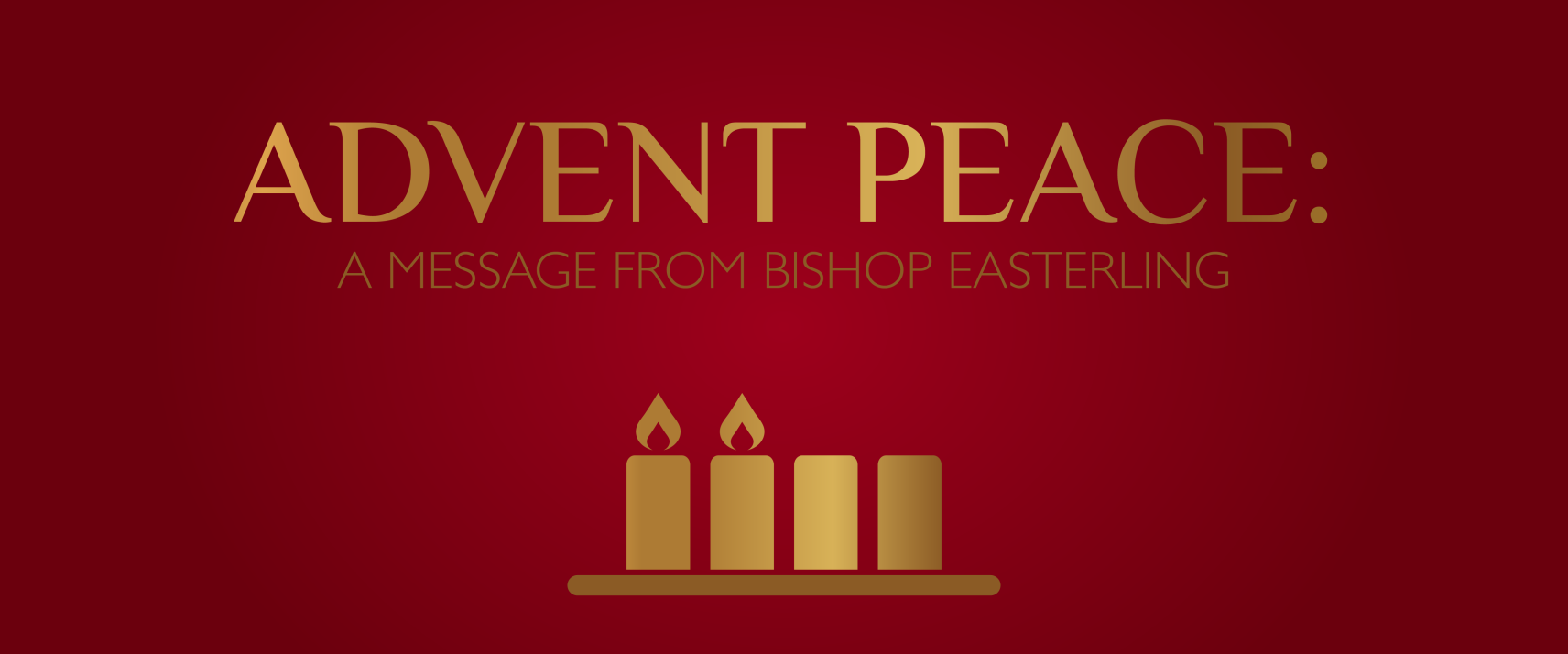Bishop Easterling's message on the Peace of Advent

And suddenly there was with the angel a multitude of the heavenly host, praising God and saying, “Glory to God in the highest heaven, and on earth peace among those whom God favors!” -- Luke 2:13-14
If there is to be peace in the world,
There must be peace in the nations.
If there is to be peace in the nations,
There must be peace in the cities.
If there is to be peace in the cities,
There must be peace between neighbors.
If there is to be peace between neighbors,
There must be peace in the home.
If there is to be peace in the home,
There must be peace in the heart.
-- Lao Tzu
As we approach the second Sunday of Advent, we light the candle of peace. In our tumultuous world, filled with daily reports of gun violence, political strife, genocide, famine, war, and even our denominational divisions, peace is the desire of many hearts. As the angels appeared to the shepherds to proclaim that a Savior, the Messiah, was born among them, the heavens rejoiced and announced peace on earth.
In the Gospel of Luke, this peace that the angel heralds may well have been an exclamation of the antithesis of Roman peace. Emperor Augustus was known to support the Pax Romana or “Roman peace.” However, that peace was borne of threat, coercion and dominance. The peace proclaimed by the angel is born of trust, love and justice. Yet, this is not a passive peace to simply be received and held within the believer’s heart. Even the proclamation was a foreshadowing of the toppling of empire and false peace, in favor of the true and just peace or shalom. This peace comes to overthrow oppression and raise up the oppressed. This peace is transformative. This is the peace that transcends all understanding.
The theologian Henri Nouwen wrote, “It is so important for the people around you to see the peace of Christ reflected in your eyes, your hands, and your words. There is more power in that than in all your teaching and organizing.” As one who worked tirelessly for justice, equality and a non-violent world, he did not believe that faith was solely an interior relationship with God through Jesus Christ; rather, he understood faith to compel one to actively work to end oppression and injustice. Nouwen modeled his belief by marching with Dr. Martin Luther King, Jr., to actively demand an end to segregation, leading protests in Nicaragua during the Iran-Contra Affair, participating in anti-war rallies and teaching others about non-violence and peaceful protests.
What gave him the courage and the strength to engage in these acts of peacemaking? The discipline of prayer.
“Prayer is the beginning and the end, the source and the fruit, the core and the content, the basis and the goal of all peacemaking,” Nouwen wrote. When we sit down to pray, we enter the presence of the God of peace who disarms our hearts, he said. “We make our peace with God, and God gives us the gift of peace. If we care about the wars in the world, the rampant poverty, and the madness of nuclear weapons, we should take that care to our prayer, to God, and let God disarm us and transform us that we might be used by God to disarm the world.”
Our life of prayer, worship, fasting, meditating and praising God should so transform us that God’s character becomes our character; God’s love becomes our love; God’s peace becomes our peace. This peace is, therefore, not situational or transient. It permeates our very being and enables us to stand resolute in God, with God, and for God. It enables us to demonstrate calm amid storms, anxiety or turmoil. This is a quiet strength, devoid of bravado or hubris. It engenders peace and confidence in others. And it empowers us to be peacemakers.
Chinese philosopher and writer, Lao Tzu, crafted a beautiful poem that ties peace in the world directly to peace in the human heart. He rightly asserted that the path to shalom begins with individuals and their embodiment of peace, but it does not rest there. That peace must be lived as the foundation of all personal relationships, as well as the ordering of society. Peace, therefore, is expressed in the eradication of the things that lead to unrest. Nations, tribes, and neighbors take up arms because of the belief that there is not enough for all to live and live abundantly. Countries and communities are plagued with violence because some believe in a caste system or hierarchies of human worth. This refusal to live as the beloved community is reminiscent of the kind of sin that led Jesus to weep over Jerusalem and lament that it did not recognize the things that make for peace.
The story of the birth of Jesus reveals a new world order that cares not just for the privileged or the few, but for all. This Advent, we celebrate that Christ comes so that all will be redeemed, that all will know love, that all will have daily bread, that all will know equity. That is the good news of peace.
